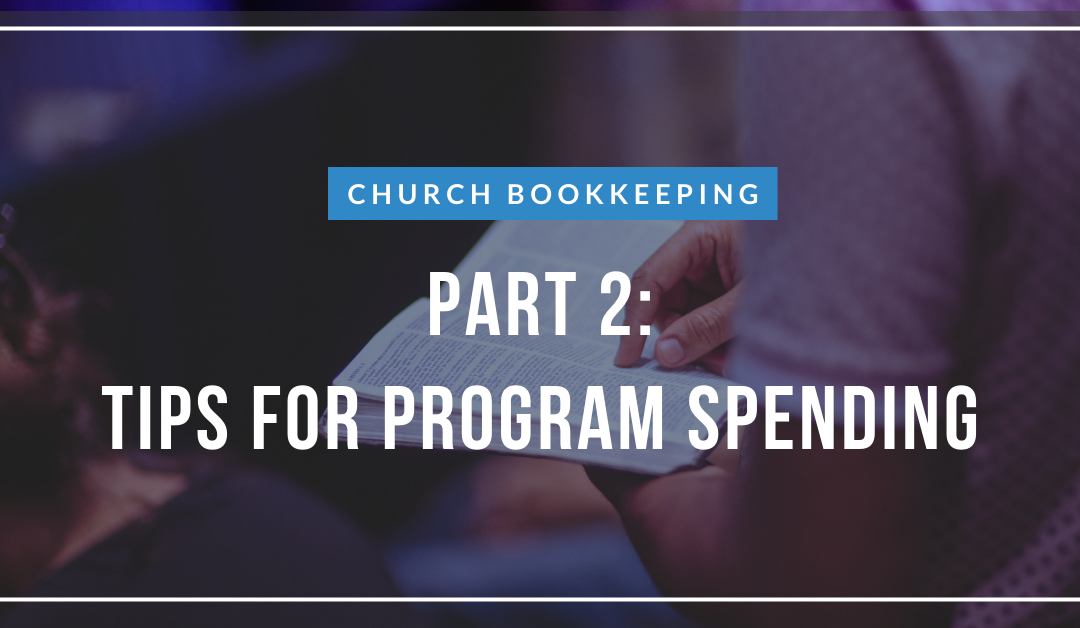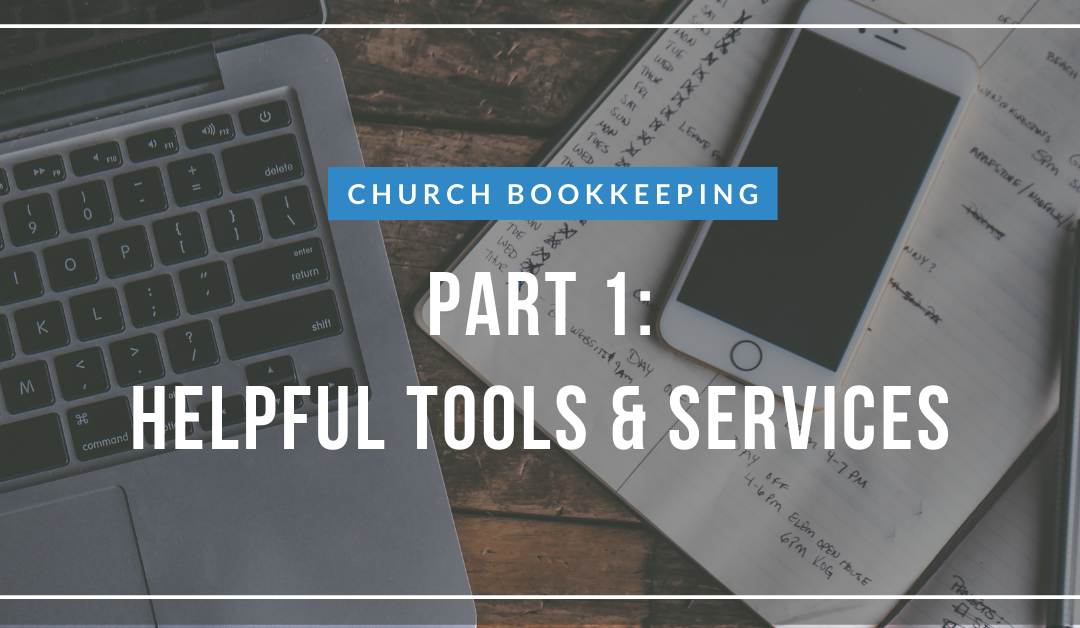
by Chris Williams | Sep 16, 2020 | Blog, Bookkeeping Best Practices, Non-Profit
Welcome to part two of our three part series on bookkeeping and finance specific to churches. This second part of the series covers program spending, restricted funds, and taxes. If you haven’t read part one it covers SAAS tools and services, I recommend reading that first since this part of the series builds on what was covered in part one, and you can look forward to the final part about budgeting.
Here in part two we will cover the aspects of church bookkeeping that often get overlooked as churches grow and operations and activities become more complex.
Program Spending
As a church grows, various ministries and programs start to take shape that require expenses, and sometimes income, to be tracked separately. Good examples of this are kids ministry, worship, building/operations — things that would often be considered “departments,” or “business segments” in the for-profit world. One option is to simply create new accounts for them, which works most of the time. However, what happens when the church wants to see supplies used by the kids ministry and the worship band separately? What if there are other accounts (food supplies, small equipment, etc.) that need to be tracked separately as well?
As this complexity grows we recommend creating “Classes” (a Quickbooks term) for each of the ministries. Terms for this vary across the accounting world but it’s essentially a way to show each ministry or program as a distinct column on the income statement. That way, it’s easier to see the goldfish crackers consumed (and sometimes inhaled) by the kids ministry separately from the muffins and croissants bought for the worship band’s Sunday breakfast.
The word of caution here is to only create “classes” for ministries where this type of separation is needed. It’s okay for other programs to exist as only an account since it’s easier to read an income statement containing three columns versus ten columns. As outsourced bookkeepers and solutions providers, this is a great opportunity for us to advise on what works best for each church’s specific needs and goals.
Restricted Funds
Most bookkeepers cringe when they hear the term “restricted funds,” and for good reason. In accounting this prompts potentially bitter memories of releasing expenses, changes to net assets, and tracking restricted income. This is usually a fair reaction because it can quite literally cause a headache with the multitude of accounting rules that dictate these funds.
Fortunately, all these requirements are only needed if the church is regularly audited according to U.S. GAAP standards. Since most churches do not fall under these standards, the process can be simplified more than you might realize!
What are “restricted funds” exactly? As with every non-profit in the country, each donation is given with an intent on how that donation will be used and organizations are bound by that donor intent. However, if churches are clear on how donations will be spent, and create a “general fund” with clear language that it will be used for general church operations and ministries it can safely be assumed that donors understand and are providing donations for that purpose. For this reason it is important that these expectations are clearly displayed or stated.
Problems arise when a donor states they would like their donation to be spent on a more specific purpose (i.e. choir robes, kids ministry, sprinkler repair, etc.). If the donation is accepted, then the donation is legally restricted to be used for that purpose. In most cases a quick conversation with the donor can convince them to change their designation to the general fund, but if not, that donation is now restricted and has to be tracked that way in the books.
It’s also perfectly normal for churches to intentionally set up a restricted fund especially if they need to raise funds for a special purpose. The most common example is a building fund set up to pay for a new roof or replace a furnace. This is most often associated with a special giving drive.
Whatever the case, the church needs to easily demonstrate two things in the books:
- How much money was collected for this purpose?
- How much money has been spent for this purpose?
Going back to the first section in this article the most effective way to answer these two questions is to set up a Class for the fund, especially if the expenses need to go to multiple accounts on the income statement. For almost all churches, using Classes will ensure that the expenses and income for the specific purpose are not mixed in with other general church giving and expenses and those two questions can be easily answered.
Taxes
I often hear the phrase “churches don’t pay taxes,” and while this is generally true there are some exceptions. These exceptions appear when churches start to engage in activities more commonly associated with for-profit companies. Here is a quick list of the more common exceptions:
- Selling books or merchandise
- Hosting a concert with paid public admission
- Collecting royalties for published content
- Receiving rent for parking lot spaces
- Fee income for a church-operated daycare
The term for these activities is “unrelated business income,” meaning they are unrelated to the normal operations of a church. All churches are required to fill out a 990 form to the IRS every year, but if they collect business-type income they are required to fill out a 990T form.
It’s important to note that just like with for-profit business some expenses related to these activities can be deducted against the income received, so it may be worth tracking the associated income and expenses using Classes, as mentioned above. Also, these types of income may be taxable to state government agencies. As outsourced bookkeepers it is important to be aware of all the income our church clients are receiving, and be able to advise them on if they are liable to pay taxes on some of their activities even if we are not the ones actually preparing the tax filings.
Final Thoughts
Currently, churches are coming under more and more scrutiny as we diversify our traditional institutions and as they change the scope and variety of ministries and services they offer. Because of this, it is important that churches stay under compliance with all tax and business laws. Keeping a clean set of books where it is easy to demonstrate how money is spent is crucial to building a healthy church.
It may seem complex to answer the many questions about how money is spent, but this process can be simplified immensely by working within the structure of a well thought out and organized budget. With clear, well formatted intentions, categories, and processes for delegating funds the process for reporting them only gets easier! Stop by next week for the final part of the series on church bookkeeping — budgeting!

by Chris Williams | Sep 2, 2020 | Blog, Bookkeeping Tech, Non-Profit
Oftentimes church bookkeeping can be a lot more difficult than for-profit bookkeeping due to the extra regulatory requirements placed on churches by the IRS and state government. We understand that these nuances can be incredibly difficult to navigate. As outsourced bookkeepers, it is our job to be experts on how to address the unique challenges of churches, and advise them on how to address those challenges in the most streamlined and efficient way possible.
We want to help relieve the sense of complexity with a three part series on bookkeeping and finance specific to churches. The three topics you can look forward to learning more about are:
Part 1 – SAAS Tools and Services
Part 2 – Program Spending, Restricted Funds, and Taxes
Part 3 – Budgeting
Let’s begin the first part of this series by taking a close look at the tools required for accurate and efficient church bookkeeping.
SAAS (software-as-a-service) Tools and Services
System Six believes that “outsourced” and “cloud bookkeeping” are dependent on each other. Even more than before, it is crucial that records and accounting be accessible no matter where people are working. Choosing cloud-based programs is not only convenient, but wise for security, availability, and quality of service for a much affordable price. Every recommendation is based on this premise.
Quickbooks Online
The first decision is to select a good bookkeeping/accounting tool. In almost all situations, I recommend Quickbooks Online (QBO) for its integration potential with other SAAS (software-as-a-service) tools, and the ability to directly connect to the activity feed for most banks and credit card companies. If the books are currently stored on a complicated collection of Excel spreadsheets, it’s probable that there is only one person who can help troubleshoot the system if there is a problem. QBO allows for multiple user access, and in turn allows for separation of duties between different bookkeeping roles spread across in-house church staff and you as the outsourced bookkeeping solution. It supports a team approach to bookkeeping that allows openness, checks and balances, and transparency across accounts. At just $20-40 per month, the benefits of choosing a “one stop shop” tool are well worth the investment.
Donor Management System (or DMS)
Each year churches and non-profit organizations scramble to provide year end statements to their donors. While the IRS does not require end-of-year statements to be sent by non-profit organizations, what they do require is that any donor claiming a charitable deduction on their taxes must provide proof of their donation, and a “written acknowledgement” by the organization fulfills this requirement. Since many church/non-profit donors will likely ask for this “acknowledgement” early in the year when they are working through their taxes, it is smart for all churches to be proactive. It is more efficient to prepare and send all the statements at once, rather than generate a single statement in response to every email or phone call from a donor.
Most churches start out small, so it is tempting to track donor information as well as donations within QBO. However it is most beneficial to be able to provide a donor statement upon request at any given moment. While there are some workarounds in QBO, most DMS’ are equipped to easily generate such a statement.
Here are some additional features common to most donor management systems:
- Providing a login to every donor so that they can view their donation record online.
- Batch reports providing a breakout of amounts contributed to each church fund.
- Ability to upload a letter template (for example, a year-end letter from the pastor), and insert a total amount given to every fund, where specified, and then email from the system along with the donor statement.
- Built-in merchant account or integration with one where donors can pay using ACH/credit card, and those donations are automatically posted to their donor account.
Each of these features by themselves offer significant savings in both time and capacity for everyone involved! Here is a good starting list of systems that we most commonly work with:
If you are interested in additional merchant accounts that integrate with some of these systems:
At this point, you likely have a burning question running through your mind, and that is “if I am tracking donations in a separate system, how do I get that information into QBO?” Oftentimes churches will try to double up their records in QBO and DMS, but generally this is unnecessary.
All you really need from QBO is financial reports because the DMS is tracking donor data. In QBO, all you need to track is the amount deposited and the breakout of the income.
It’s worth noting that NeonCRM (listed above) actually has an integration with QBO that will batch the donations and create a deposit entry in QBO that matches both the credit card and bank deposits. If the church you are working with receives a lot of ongoing donations, this is a huge time saver!
Final Thoughts
It’s important to note the unique relationship between a church and it’s donors. Primarily, that almost all donors regularly attend that church, and can visibly see how the money is spent and the results of their contribution. At any time, it is smart for a church to be ready to answer financial questions from their regular attendees, and they need to have the tools in place to quickly and easily answer those questions. As outsourced bookkeepers, we are in a great position to advise and manage the tools and solutions that remove financial pain points for the churches we serve.
We understand that there are similar frustrations in regards to budgeting, taxes, and spending, so look forward to the next two parts of this series. Church bookkeeping can be complicated, but with help from dedicated experts, it doesn’t have to be.
by Chris Williams | Aug 27, 2020 | Blog, Bookkeeping Tech, Leadership
Earlier this year, one of our favorite payroll providers, Gusto, decided that  one of the best ways to continue to innovate its product was to build an advisory council composed of the experts who use it every day: their accounting partners. After invites and interviews, Gusto created its first Gusto People’s Advisory Council (GPAC) with an exclusive set of members to act as their panel of experts for product and service feedback. GPAC is meant to be heavily relied on as Gusto works on releasing platform updates for payroll, benefits, and HR.
one of the best ways to continue to innovate its product was to build an advisory council composed of the experts who use it every day: their accounting partners. After invites and interviews, Gusto created its first Gusto People’s Advisory Council (GPAC) with an exclusive set of members to act as their panel of experts for product and service feedback. GPAC is meant to be heavily relied on as Gusto works on releasing platform updates for payroll, benefits, and HR.
Forty firms are represented after the selection process and I am super excited to represent System Six alongside the various companies that are part of GPAC. There’s a wide variety of small and large firms from all areas of accounting, tax and finance. The Gusto team heading the program are super innovative, pose great questions and ideas, and desire to integrate our feedback on the Gusto product.
Representing People Well
The most recent update to Gusto was the release of their People Advisory Certification. Over the past year and with the advent of COVID, it’s become more and more apparent that payroll cannot be separated from other employment practices (What kind of benefits do you offer? What kind of benefits can you offer? What are the state-mandated sick leave laws? Are you required to offer PTO?). The People Advisory Certification is designed to train accountant-users how to utilize the HR features built into the Gusto software to better advise our clients through these and similar questions.
As always, we at System Six strive to represent and advocate for you at every turn. With ever-changing products and procedures, we aim to be on the edge of new developments. It’s our hope to be the first to bring you services that can support your business goals and systems. This partnership with Gusto will allow your concerns and input to be directly channeled to those who have the ability to make improvements. I can’t wait to see what changes will be made that will directly improve your user experience and am proud to represent System Six and our clients on this panel.
by Dev | Jul 3, 2020 | Blog, Bookkeeping Tech, Leadership
The team at System Six is celebrating with our founding partner, Jeremy Allen, who has recently been selected to serve a two year term on the Intuit Accountant Council!
“The Accountant Council features forward-thinking, tech-savvy accounting professionals from across the United States,” says Mindy King of Intuit Quickbooks.
Several hundred applications pour in each year for a spot on the committee whose members bring expert  insight, innovation, and strategy to product development and services for the company. Their wisdom and experience directly impacts the success of small businesses around the globe. Jeremy will be serving a two year term on the sixteen member council which meets both virtually and in-person at their Silicon Valley headquarters.
insight, innovation, and strategy to product development and services for the company. Their wisdom and experience directly impacts the success of small businesses around the globe. Jeremy will be serving a two year term on the sixteen member council which meets both virtually and in-person at their Silicon Valley headquarters.
We are so proud to have Jeremy representing System Six in such a prestigious capacity. We know that he will bring the same client-centered, service-oriented approach to the Council that he brings to his clients and team every day. Congrats, Jeremy!
For the full article from Intuit, click here.



 one of the best ways to continue to innovate its product was to build an advisory council composed of the experts who use it every day: their accounting partners. After invites and interviews, Gusto created its first Gusto People’s Advisory Council (GPAC) with an exclusive set of members to act as their panel of experts for product and service feedback. GPAC is meant to be heavily relied on as Gusto works on releasing platform updates for payroll, benefits, and HR.
one of the best ways to continue to innovate its product was to build an advisory council composed of the experts who use it every day: their accounting partners. After invites and interviews, Gusto created its first Gusto People’s Advisory Council (GPAC) with an exclusive set of members to act as their panel of experts for product and service feedback. GPAC is meant to be heavily relied on as Gusto works on releasing platform updates for payroll, benefits, and HR. insight, innovation, and strategy to product development and services for the company. Their wisdom and experience directly impacts the success of small businesses around the globe. Jeremy will be serving a two year term on the sixteen member council which meets both virtually and in-person at their Silicon Valley headquarters.
insight, innovation, and strategy to product development and services for the company. Their wisdom and experience directly impacts the success of small businesses around the globe. Jeremy will be serving a two year term on the sixteen member council which meets both virtually and in-person at their Silicon Valley headquarters.